![]()
Study shows tax investors exploit property tax laws targeting Black, Latino communities
New Pappas study: Tax investors exploit Illinois property tax law they shaped to reap millions in profits from Black and Latino communities. Homeowners and governments losing out on important funding
A new study from the Cook County Treasurer’s Office reveals that hedge funds, private equity firms and others are exploiting a loophole in Illinois’ property tax law to make millions of dollars in profits, mostly at the expense of Black and Latino communities.
These investors, known as tax buyers, have helped shape the arcane section of the property tax law they now use to their advantage.
They have drained nearly $280 million from Cook County taxing districts over the last seven years. Of that, 87% came from Black and Latino communities.
“Investors from all over the country are drawn to our tax sale like it was the California Gold Rush,” said Cook County Treasurer Maria Pappas.

“They’re getting rich from struggling communities. The money they make from the law they helped rewrite should be going to schools, parks, police departments and other government agencies.”
Tax buyers pay property owners’ delinquent taxes, aiming to make money when the taxpayer repays that debt, at steep interest rates.
The tax buyer gets a lien on the properties on which he or she paid the taxes. That lien allows the tax buyer to take properties if taxpayers don’t pay their debt within a specified time period.
But these investors usually do not want to take possession of a property. They have an out: Illinois’ broad and forgiving sale-in-error statute that allows the tax buyers to avoid taking the property and instead get back their investment, often with interest.
Many states have policies that allow tax buyers to get repaid when the government has sold a property it shouldn’t have, including when the property is government-owned or when the taxpayer made good on their debt before the sale.
In Illinois, however, tax buyers can get their money back for “errors” by any county official even when the “errors” would not have prevented a sale or do not cause financial harm to the tax buyer.
Tax buyers helped rewrite the property tax law in 1951, allowing them to get their money back for errors they had committed. In 1983, state lawmakers expanded the scope of the law to include errors by county officials, creating a loophole tax buyers have exploited ever since.
The Pappas study cited “frivolous” reasons for which tax buyers got their money back, with interest:
• A house was listed as made of stucco when it was made of brick
• A two-story commercial building was listed as having zero square feet of space.
• A home was listed as not having air conditioning when it did.
When a tax sale is undone due to a sale in error, most of the money paid to the tax buyer comes from the revenue of local governments, especially harming cash-strapped Black and Latino communities where the majority of tax sales occur.
The Treasurer’s research team surveyed government financial offices in large out-of-state municipalities that sell taxes. None reported having anything as charitable to tax buyers as Illinois’ sale-in-error statute. In other states, “buyer beware” was the tax sale motto.
Tax buyers must do their own due diligence and assume the risk. No other government granted refunds for government website errors.
“We don’t have that problem, thank goodness,” said Michelle Jones, the Newark, N.J. tax collector, about the frivolous reasons that sales in error are routinely used by tax buyers in Illinois.
“That’s ridiculous. You need to amend that. I think they’re taking advantage of you guys.”
Treasurer Pappas’ study makes many recommendations for state legislative changes, including:
• Changing Illinois law to require tax buyers to prove an error was “material” to the tax sale and they were financially harmed. This would prevent them from profiting from frivolous mistakes.
• Disallowing sales in error for mistakes on the Assessor’s website, given that the Assessor tracks nearly 1.8 million properties, making it impossible to be totally current on the status of each property.
Several county agencies also made errors, including not serving the required taxpayer warnings on time and assigning incorrect addresses to properties. The Treasurer also made recommendations aimed at reducing those errors.
In an extraordinary display of local government transparency and accountability, the Treasurer ordered her research unit to explore faults in the sale-in-error law, even if part of the problem could be traced back to her office.
The research team found that the Treasurer’s Office had erroneously sold the taxes on government-owned properties, scores of which were highways, and on other properties that were tied up in a bankruptcy proceeding at the time of the sale.
About Treasurer Maria Pappas
Maria Pappas is Treasurer of Cook County, Illinois, a post she has held since 1998. She was elected to a sixth four-year term in November of 2018.
Pappas hit the ground running when she became Treasurer, moving with amazing velocity to remake an antiquated office. She is still running and, if anything, is moving yet faster.
Cook County is one of the world’s largest economies, with 5.2 million people and the nation’s third-largest city, Chicago. The Treasurer’s Office handles $18 billion a year, almost $13 billion in property taxes on some 1.8 million parcels of property. The property tax revenues then must be distributed to 2,200 local government agencies such as municipalities, school districts, police and fire districts, library district and others that tax properties. It has to be done right and it has to be done fast.
Pappas didn’t like what she saw when she walked into her office for the first time. For one thing, piles of cardboard trays were on the floor. A mess? Yes, but of the worst kind, a financial mess that had no reasonable explanation. There were more than $30 million in payment checks on the trays, undeposited and gathering no interest for the County. This was going to be a daunting task for the new Treasurer.
Was Pappas prepared to straighten things out? She was.
A lawyer with a degree in counseling psychology, this granddaughter of Cretan immigrants was born on June 7, 1949. She was raised in Warwood, West Virginia, a town of 2,000 near the coal-mining city of Wheeling. As a child, she studied the Greek language and all kinds of music. She played the electronic pipe organ, directed the choir and traveled around the country with the all-state band as bass clarinetist. As a drum majorette, she won nine gold medals in baton-twirling competitions.
Education is her life-long passion. Pappas earned a degree in Sociology from West Liberty State College (now University), in West Liberty, West Virginia, in 1970; a degree in Guidance and Counseling at West Virginia University in Morgantown in 1972; a doctorate in Counseling and Psychology at Loyola University of Chicago in 1976; and a law degree at Chicago-Kent College of Law at the Illinois Institute of Technology in 1982.
Having come to Chicago, Pappas’ public career grew out of her studies at what is now Adler University and a grant from the Illinois Attorney General’s Office to work in Chicago’s Altgeld Gardens public housing project. At Altgeld Gardens, she managed the Day One Drug Abuse Center, keeping young people free of drugs. Testifying in related court cases involving young people led her to visit prisons and jails, which led her to go to law school, which led her to consider public service. In 1990, she ran for Cook County Commissioner, one of 17 such positions on the Cook County Board of Commissioners, which oversees health care, law enforcement and other matters.
Pappas won and for eight years represented constituents from Chicago’s North Side and North Shore suburbs. As a county commissioner, she made every meeting interesting and built a reputation as a budget guru, a fiscal hawk who supported tax cuts, open government and efficiencies in an inefficient government – which she let people know about.
She successfully fought for human rights ordinances and introduced measures to install reform in areas such as truth-in-lending budgeting, ending no-bid legal and bond-issue contracts, and status reports by outside consultants. She co-authored an extensive study on teenage pregnancy, outlining a program to combat a key societal issue. All along, she heard that she should hold her own office.
In 1998, she ran for Cook County Treasurer and won.
When Pappas was a commissioner, the Treasurer’s Office was the poster child for governmental inefficiency. The office had four working computers, six typewriters and dozens of letter-openers – payment envelopes were slit open by hand and sums written in ledger books. That may explain the $30 million in checks sitting on the floor.
Pappas immediately obtained a bank lockbox to deposit not only those checks but all future checks on the day they were received. In her first year, interest on deposits went from $4.8 million to almost $19 million. Pappas says the Treasurer’s Office she walked into in 1998 reminded her of some Third World countries she has seen.
With a vision of making her office paperless, Pappas kept changing things, innovating, turning the office into a networked system of computers that integrated collections, deposits, earnings, distributions, refunds and other data previously logged manually. An integrated cashiering and general-ledger system resulted in speedier access to payment and other data for taxpayers and local government agencies.
She established a website, cookcountytreasurer.com, that averages 450,000 visits a month so taxpayers can live the paperless life, checking their payments, searching for refunds, seeing their exemptions, and more. Her Debt Disclosure Ordinance of 2009 provides taxpayers an up-close view of the debts, operational and pension-related, of the governments that tax them – information that goes also on tax bills mailed to taxpayers. Pappas is proud of this extraordinary exercise in data transparency, saying taxpayers now can monitor their governments and the taxes they levy.
Pappas has taught psychology and family relations across the United States and in eight European countries and Israel. Despite holding a small, if significant, local government office, Pappas’ reputation for technological savvy and understanding of local sensitivities has caught the attention of foreign governments, some of which have visited to see how she does what she does. She has shown China how to develop a property tax system and to network hospitals. She has also consulted with Greece on issues involving criminal justice, taxation and general automation.
Pappas has gone from strength to strength in streamlining operations, particularly in the labor-intensive and too-deliberate process of refunding overpayments to taxpayers. Those seeking refunds no longer have to apply for them – Pappas’ office developed a system to locate those owed a refund and send the check to them without all the paperwork.
Her dedication to the people she serves was shown dramatically in 2017, when a change in federal tax law meant taxpayers would lose their property tax deductions if they failed to pre-pay before January 1, 2018. Pappas developed the means to accept early payments on her website and in her office. She kept the doors open on New Year’s Eve, a Sunday, so late-payers could come in and meet the deadline.
Pappas served them baklava.
And her office had collected more than $750 million in early payments that Cook County taxpayers were able to deduct on their income taxes.
Pappas’ achievements include:
- Reduced staff from 250 employees in 1998 to 58 employees in Fiscal Year 2022, a reduction of 77 percent.
- Submitted 21 consecutive budgets that have either met or gone below the targeted figure.
- By fiscal year 2022, offset 94 percent of the County’s annual budget allocation to the Treasurer’s Office, using non-tax revenues to upgrade technology, streamline processes and reduce staffing costs.
- Closed five of her own satellite offices but opened payment facilities at all Chase branches in Illinois and more than 100 community banks in Cook County.
- Inaugurated online payments, via cookcountytreasurer.com, so payment of current and prior years’ taxes owed can be paid online from any computer anywhere at any time of any day.
- Established an online system for mortgage companies and banks (third-party agents) to pay in bulk via wire payments.
- Created outreach materials in English and 27 other languages.
- Website content translated easily into 108 foreign languages.
Pappas is especially proud of the Debt Disclosure Ordinance (DDO), an unprecedented step for transparency in government. The DDO came out of questions she encountered from taxpayers about rising taxes. Recognizing that taxpayers needed to actually see how much of their taxes were going to which local governments (taxing districts), Pappas oversaw design of a system that shows how much each taxing district is billing taxpayers and how much it owes in debt for pensions, operations and other costs. The information is on both her website and on property tax bills mailed to taxpayers. Pappas urges citizens to use the information to monitor local-government spending.
Pappas’ website has enormous amounts of information about the property tax system, and her office designed cookcountytreasurer.com to be interactive and informative. Not only can taxpayers pay current and prior-year taxes online, they also can check payment status, search for refunds and check on exemptions. The website offers downloadable forms and applications, information on mortgage escrow, and answers to frequently asked questions.
The office’s phone system, 312.443.5100, gives assistance in English, Polish and Spanish. As on the website, the phone system allows taxpayers to determine payment status, search for refunds going back 20 years and verify property tax exemptions.
Cook County is one of the nation’s most diverse counties and Pappas’ website addresses that diversity with brochures in print and on the website in Albanian, Arabic, Assyrian, Bulgarian, Chinese, Croatian, Czech, English, German, Greek, Hindi, Italian, Japanese, Korean, Lithuanian, Polish, Romanian, Russian, Serbian, Slovakian, Spanish, Thai, Ukrainian and Urdu.
Pappas remains active in seminars and think-tank sessions. She has participated in Symi Symposiums on world economic matters in Greece, and has attended the prestigious Aspen Institute Executive Seminar.
An avid bicyclist, runner and swimmer, Pappas has participated in some 100 rides, marathons, triathlons and long-distance rides for charity, including: 500-mile Midwest AIDS Ride from Minneapolis to Chicago; Cowalunga Tour to benefit the American Lung Association; and two Ground Zero-to-Pentagon rides to commemorate the September 11 terrorist attacks.
Pappas is a skilled chef dedicated to healthful food who prefers to prepare meals with pressure cookers, sometimes firing up six for one night’s fare.

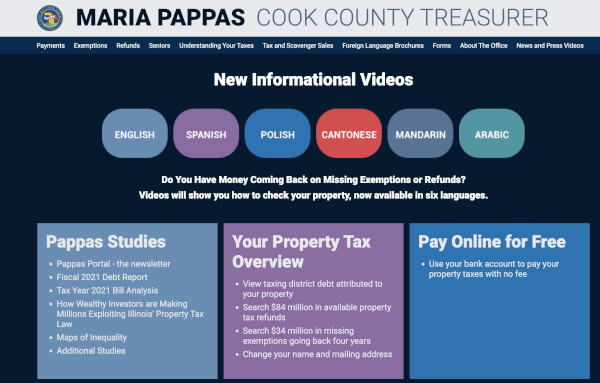
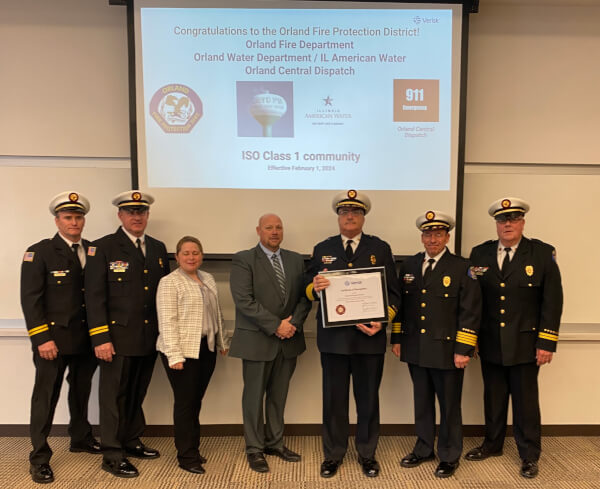
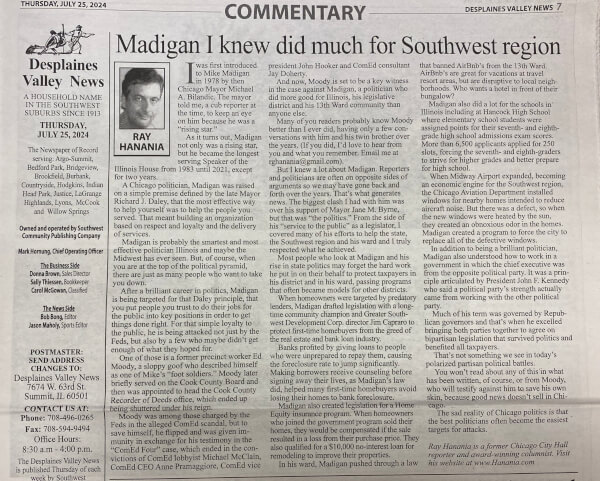

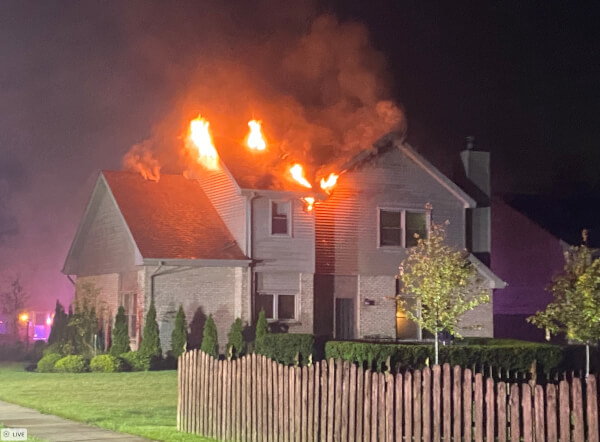
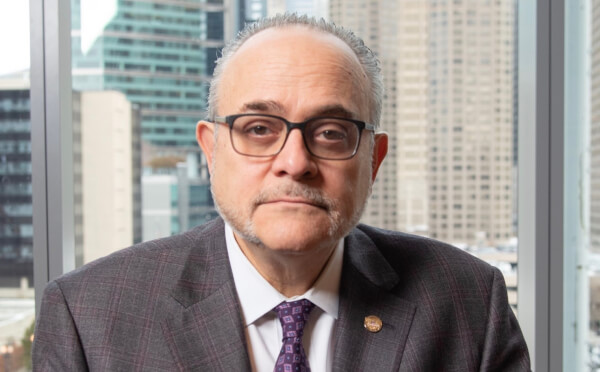

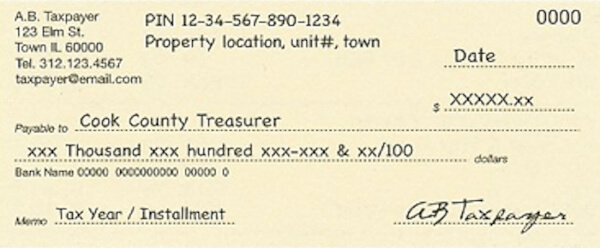


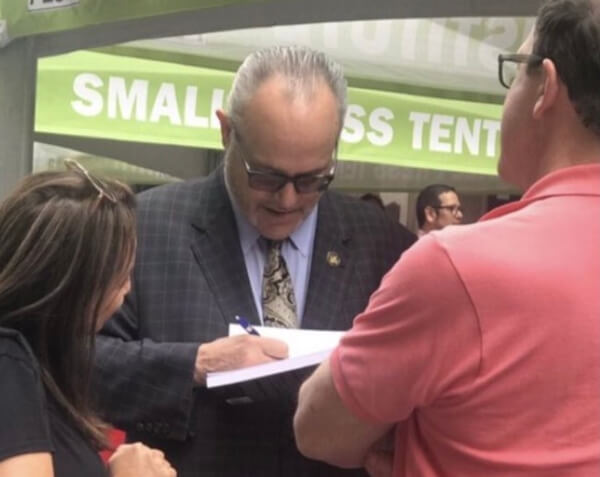
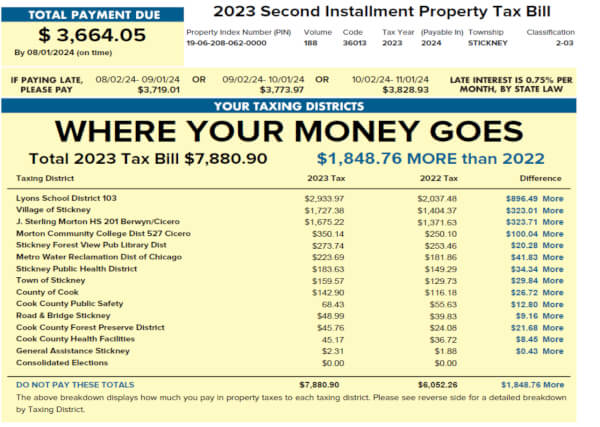




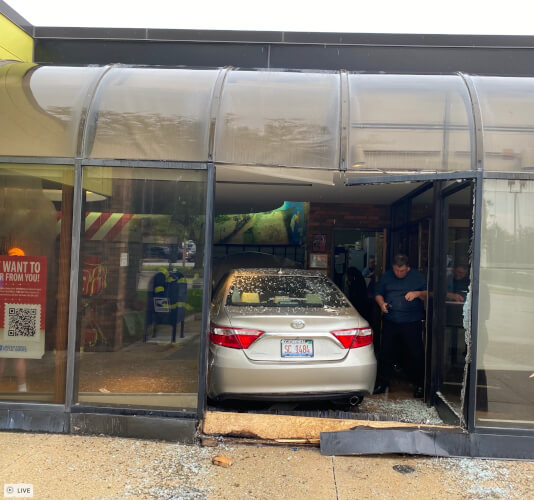


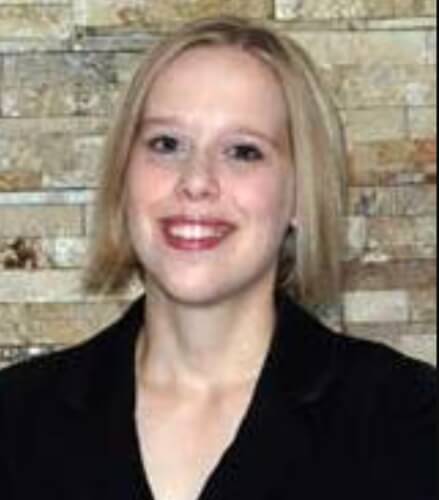
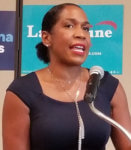



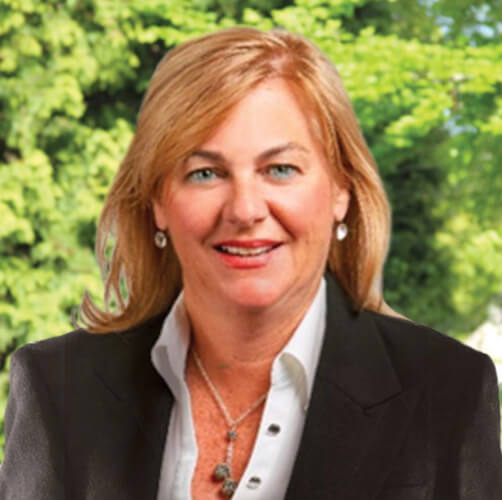
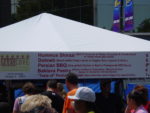

Comment on “Study shows tax investors exploit property tax laws targeting Black, Latino communities”